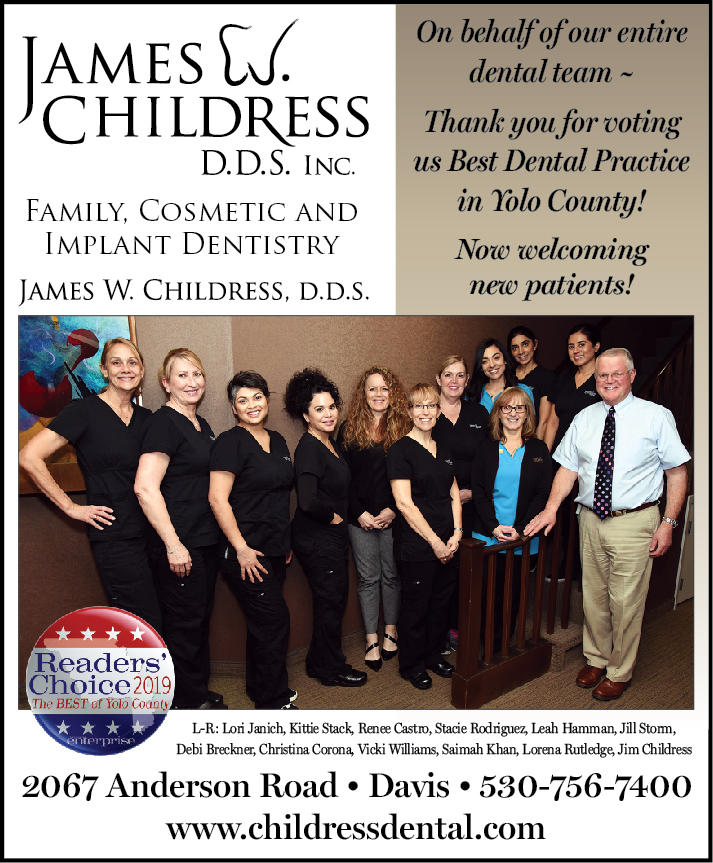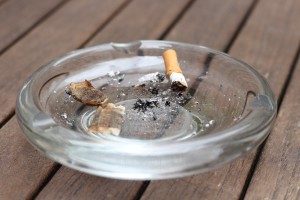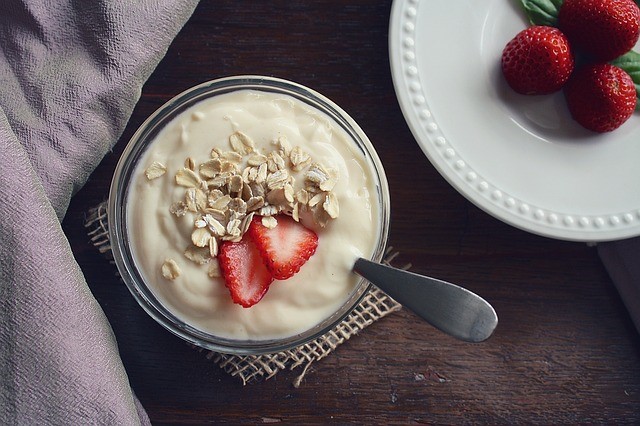
Davis, CA Dentist | Readers’ Choice 2019 The BEST of YOLO County



Your smile is one of the first things a person will notice when you meet. If you would like to improve your smile with a simple procedure, teeth whitening may be a great option for you, especially if you have stained, dull or discolored teeth. Our dental office is providing teeth whitening services to new and existing patients.
Regardless of how well you care for your teeth, over time, discoloration will occur. The main causes of stained teeth are genetics, antibiotics, tobacco and certain foods. As we age, our teeth darken as well. While preventing tooth discoloration is nearly impossible, our experienced team can help reverse the effects of discoloration by helping to create a whiter and brighter smile.
Whether it’s an in-office treatment or at-home treatment, the principles of teeth whitening are the same. A special whitening agent is applied to the teeth in order to bleach the stains and brighten your smile. Our expert dentist will discuss your whitening needs and goals with you to determine which option is best for you.
In-office teeth whitening is the quickest method to a brighter, whiter smile. With the supervision of an experienced dental professional, a stronger bleaching solution can be used than with at-home kits. Optimal results are achieved much faster with the professional whitening treatment, and in many ways the results are much better given the nature of the bleaching agents that are used. On average, patients find they appear up to ten years younger just by restoring the bright, white smile of their youth.
During a professional teeth whitening treatment, we will first clean the teeth. They will apply a whitening agent to your teeth, carefully avoiding your gums and soft tissue. Once applied, a laser light will be directed at the teeth to expedite the process. For maximum results, the process may be repeated more than once.
If a visit to our office for professional whitening isn’t an option for you, at-home treatment may provide the whitening you need. While you will find a vast variety of at-home teeth whitening products on the market, including whitening toothpastes, over-the-counter gels, rinses, strips, trays and more, we can fit you with custom-made whitening trays that will more accurately fit to your teeth for a more even whitening result.
At-home teeth whitening results are less dramatic compared to those achieved at the dentist. While at-home teeth whitening is easy to use, it is not recommended if your teeth or gums are sensitive.
If you are looking to brighten your smile and look ten years younger, contact our office for more information or to schedule a consultation today.

If you have crooked teeth, you may already be looking into orthodontic solutions to improve your smile. However, did you know straightening your teeth can have benefits beyond increased confidence?
Many people may not realize it, but your oral health plays a large role in your body’s overall health. Poor oral health can put you at a much higher risk of stroke, heart disease, illness, miscarriages, and more. Crooked teeth can impede your ability to take proper care of your mouth, putting you at an increased risk of any number of ailments. Below are some of the most common issues exacerbated by crooked teeth. If you are experiencing any of these issues, contact our office today to see how orthodontic care can offer relief.
Gum Disease
Crooked teeth can often be much harder to properly clean than straight teeth. Without regular brushing and flossing, your chance of developing gum disease increases significantly. An untreated buildup of plaque can lead to gingivitis and periodontal disease, the leading cause of tooth loss among adults. Swollen and irritated gums can open the door for bacteria to enter your blood stream and trigger inflammation elsewhere in your body and increase your risk of stroke, heart disease, and more.
It’s important for everyone to maintain a proper oral care routine and visit their dentist at least twice annually for cleanings and examinations. However, even that may not be enough if your teeth are too crooked to properly clean. We offer a variety of orthodontic solutions to help correct misaligned teeth and make it easier for you to take care of your smile. Visit our office today to learn more!
TMD/TMJ Pain
Crooked teeth or an improper bite may increase your risk of developing temporomandibular joint disorder (TMD). While the most common cause of TMD is the clenching and grinding of teeth, a misaligned bite may be a contributing factor. TMD can cause soreness and discomfort in the jaw, clicking sounds while chewing, headaches, and other facial pain.
If you have been experiencing jaw pain, an evaluation may help you determine if treatment for TMD is necessary. Correcting a misaligned bite can go a long way in alleviating some of the discomfort caused by TMD.
Enamel Erosion
Enamel is the thin, tough shell coating the outside of your teeth that protects them from damage and wear. Though a variety of environmental factors can lead to enamel loss, teeth grinding is another common cause. When your teeth are crooked and your bite does not properly align, the simple acts of speaking and chewing can cause your teeth to grind against each other. When left untreated, this can contribute a degradation in your enamel.
A loss in enamel can lead to tooth discoloration, increased pain and sensitivity, and cracks and chips forming in your teeth. There is a lot you can do at home to protect your enamel, including drinking plenty of water, avoiding excessively acidic or sugary foods, and brushing and flossing regularly. However, your crooked teeth may limit your ability to prevent enamel erosion on your own. Contact our office today to see if orthodontic treatment could be the solution you need.

It seems like there is a new headline nearly every week featuring someone who swears their teeth are whiter and brighter due to their natural home remedy for stain removal. These articles showcase the idea that whitening can be cheap and easy, if in some cases unpleasant. It can be tempting to consider trying for brighter, whiter teeth without investing time and money on in-office or at-home whitening under a dentist’s care. However, before you pin your hopes on one of these “natural whitening” methods, take a look at the truth behind some of the recent fads.
Fad 1: Oil Pulling
Oil pulling has been cropping up in headlines for months with claims of a wide variety of potential health benefits. It is a very old folk remedy in which a person swishes a tablespoon of edible oil, such as coconut, sunflower, olive, etc., in their mouth and between teeth for up to 20 minutes daily.
Despite the number of years this practice has existed and the number of health issues it purports to treat, there is no evidence that oil pulling whitens teeth or improves health.
Fad 2: Fruits
Due to celebrity endorsement, some people have begun to try rubbing mashed strawberries on their teeth to try to achieve a whiter smile. Others are using lemon or orange peels, and still others tout the virtues of eating pineapple or swishing apple cider vinegar.
However, there is no science to support any of these claims. In fact, one recent study found that brushing with a mixture of baking soda (which is known to have whitening effects on teeth) and strawberries did not whiten teeth. Even worse, the citric acids found in all of these fruits and vinegars can actually be harmful to the enamel on your teeth.
Fad 3: Hydrogen Peroxide
While it is true that many forms of in-office and over-the-counter teeth whitening make use of hydrogen peroxide, there is more to consider before opening a bottle. The hydrogen peroxide used in professional teeth whitening, whether in-office or at-home, is mixed with other substances and provided in a form designed for use in teeth whitening.
Simply swishing from a bottle of hydrogen peroxide will have little or no effect on the whiteness of your teeth, but may cause irritation to your gums and mouth and can be dangerous if accidentally ingested.
If you want whiter, brighter teeth, there are safe and effective ways to achieve your goal. Talk with our doctor for a recommendation for what kind of whitening will be best for your needs. For more information about whitening, contact our office.

Chewing and smoking tobacco are known to cause severe health problems, particularly in the lungs. But the risks to your mouth and teeth can be just as extensive and alarming. If you use tobacco, stop. Here’s what tobacco can do to your oral health.
Chewing Tobacco
According to the Academy of General Dentistry (AGD), tobacco chewers increase their risk of developing gum and cheek cancers by 50 times. Tobacco dissolves the gums which leads to sensitivity from exposed roots. This also makes for an ideal location for bacteria to grow, leading to decay. If you are chewing tobacco, stop, and ask our experienced oral health team about what you can do to keep your mouth healthy.
Smoking
According to a report by the AGD, smoking one pack a day can lead to the loss of two teeth each decade of your life. Smoking increases your odds of losing teeth. Cigarettes and cigars are both damaging to your oral health. Smoking can cause staining as well, leading to an unattractive smile.
Oral Cancer
Oral cancer can develop in several places in your mouth including on your tongue, lips, mouth floor, and gums. Those over 50, are at an increased risk of developing oral cancer, as are men. However, Oral cancer has been on the rise, especially for people under 30 according to the AGD. Schedule an appointment with us to receive a thorough oral health examination, and ask us about an oral cancer screening, particularly if you are a tobacco user. Oral cancer screenings are often very quick as our dentist checks your mouth, teeth, and cheeks for signs of irregularities. If caught early, oral cancer can be treated.
If you are a tobacco user, we strongly advise you to quit. You can work with our professional dental team as well as your doctor to overcome tobacco use. Everyone should be receiving regular oral health examinations, but if you are a tobacco user, you need to be especially vigilant in doing so. Schedule a visit to our office so that we can work with you to identify any potential issues.
For more tips on keeping your mouth healthy or to schedule your next visit to our office, please contact us.

Do your children constantly ask for sugary snacks that you know are not good for their health? There are healthy alternatives to the junk food your child loves that taste just as great. Here are a few options to get you started.
Low-Fat Yogurt with Berries
Premade parfaits can be high in sugar with added fat and artificial flavors. Make your own parfaits at home with plain low-fat yogurt to cut down fat and calories. This combination of food gives you a balanced meal consisting of protein, calcium, and fiber. These are all important nutrients to keep bones and teeth growing strong. The berries also provide antioxidants which are very important for overall health.
Celery Sticks with Cream Cheese and Sunflower Seeds
Usually kids will do anything they can to get away with not eating vegetables. Have you ever thought of pairing vegetables with a snack they love? Cream cheese will make the celery more appealing to your children. The celery is fibrous and will gently scrub their teeth as they chew. The sunflower seeds are an added bonus containing magnesium and Vitamin B.
Hummus with Toasted Whole Grain Pita
This is a snack that has become popular over the years. It is delicious and also great for your child’s teeth. Hummus can prevent sugars from sticking to your teeth, decreasing the risk of cavities. Whole grains are nutritionally better than white bread, which has more sugar.
Cheddar Cheese and Apples
Placing cheddar cheese and apples on a whole grain cracker is a tasty treat for your child. The apples are high in fiber and water, which will help wash away bacteria and food particles. The cheddar cheese gives your child an extra dose of calcium to keep their teeth durable.
Tip: Do not forget to throw in a bottle of water with your kid’s snack. It will wash away any sugar, bacteria, and plaque left on their teeth from eating.
Remember to schedule regular dental appointments for your children’s constantly evolving teeth. For more healthy options, call and visit our office today.

When you are close to someone you can often be overly comfortable in sharing. This is especially true with kissing. In one kiss, more than 500 germs can be shared between two people. Sharing a kiss can have an impact on your oral health. Here are some of the dangers of kissing.
Colds & Flus
When you feel like you might be coming down with a cold or flu, it is best to avoid kissing. You certainly don’t want to transmit any diseases. Colds and flus are easily passed on through saliva and nasal fluids.
Cold Sores
If you see a cold sore near your mouth and lips, you should avoid kissing someone. Cold sores will look like small, clear blisters usually close to your lips. Cold sores are a viral infection, but are extremely contagious. Cold sores that are leaking fluids are especially contagious, however even a sore without any fluid can spread to others in contact. Avoid contact if you see cold sores!
Mono – The Kissing Disease
Mononucleosis, or mono, is spread very rapidly through kissing. The disease can also be spread by sharing behaviors such as sharing a cup, food, or straw. We recommend avoiding sharing your food and drink with others. Someone carrying mono might appear healthy, so always play it is safe by avoiding sharing your food and your germs.
Tips for Fresh Breath
It makes sense to want to have a clean, fresh breath when kissing. It is best to avoid foods that contain strong spices and flavors, such as garlic or onion. Long after they have been consumed, it is still possible to smell these foods on someone’s breath. Make sure you follow a regular daily oral hygiene routine. This includes brushing your teeth twice daily, as well as brushing your tongue, roof of the mouth, and inside of your cheeks. We suggest using a mouthwash or sugar-free gum after eating to help diffuse strong odors. Sometimes bad breath can be caused by other factors, so if you feel these solutions are not working, make an appointment with us.
Hundreds of germs can be shared when kissing. Watch out for cold sores as well as cold or flu symptoms. Don’t forget to keep up with your daily brushing and flossing routine.
For more tips on keeping your mouth healthy, or to scheduleyour next visit, contact our office.

Your teeth age with you. It’s important to keep them strong and healthy even as you grow older. Seniors are at a higher risk for developing periodontal disease. In addition to getting a regular dental examination, here are some other tips to keep your teeth healthy.
Keep a Routine
Regardless of age, we cannot stress the importance of keeping up with a daily oral hygiene routine. Make sure you are brushing twice-daily and flossing at least once per day. For seniors with dentures, it is important that you remove them for at least four hours each day. We recommend removing them at night. Dentures need to be cleaned daily so make it part of your routine as well. We also suggest staying hydrated by drinking water. Not only does water help keep you producing enamel building saliva, but if it contains fluoride, it can help keep your teeth strong. Make a regular visit to our office part of your routine as well.
Tips for Caregivers
If you are the primary caregiver of someone elderly, working with them to keep their teeth healthy can be a challenge. It is up to you to remind them to brush and floss regularly. Help them by establishing a routine and set times for brushing their teeth. We ask that you assist them in making an appointment to visit our dental office. If keeping up with daily dental health seems to be too difficult, please contact our office. We can work with you to offer some advice and solutions.
Financial Assistance
For seniors in a nursing home that are enrolled in state or national financial programs, the American Dental Association (ADA) suggests considering the Incurred Medical Expense regulation. This works to assist in paying for care that is deemed a necessity. If our dentist finds that treatment must be done, consider this as an option to lessen the financial burden. Talk to your nursing home or care facility’s caseworker for more information.
Don’t Forget About Gums
Periodontal disease, or gum disease, can be brought on by certain medications. When you visit our office, be sure to update us on any changes to your medications. At times, early periodontal disease is painless which makes it even more important that you keep a regular routine of visiting our office for a thorough exam and evaluation. According to the ADA, more than 47% of adults over the age of 30 have chronic periodontitis.
Keeping your teeth healthy as you age can be difficult. We suggest sticking to a daily routine in terms of brushing and flossing, and keeping up with regular visits to our office. If you are the caregiver of an elderly spouse, parent, or loved one, do not overlook their oral health. Make sure they are receiving the needed attention and are sticking to a daily oral healthy routine.
For more tips on keeping your teeth health or to set up your next appointment, please contact our office.

In addition to brushing your teeth twice each day and flossing at least once, it is also important to take good care of your tongue. Bacteria can build up on your tongue throughout the day. For some patients, using a tongue scraper can be the best solution for a cleaner, healthier tongue.
Should You Be Using One?
The Academy of General Dentistry (AGD) found scraping your tongue results in a noticeable decrease in the sulfur compounds which can lead to bad breath. According to a study in the Journal of Periodontology, tongue scrapers reduced these compounds by 75%, while using a standard toothbrush only reduced 45% of sulfur compounds. Choose a method that works best for your mouth, but make sure you are taking care of your tongue.
What Do They Do?
While they may help alleviate bad breath, scraper’s main function is to clean off debris and bacteria from your tongue. Your toothbrush is designed to effectively clean teeth, but the surface of your tongue is very different from that of your teeth. A tongue scraper may provide a more thorough cleaning for your tongue.
How Do I Use One?
Start by washing out your mouth. When you are ready clean your tongue, place the scraper in the back of your mouth, and gently pull it forward. Make sure you are scraping all areas of your tongue, but do not push so far back that you gag. You will want to rinse your mouth after you are done. Be sure to clean the scraper when you are finished.
While you might not be used to cleaning your tongue, it can be an effective solution for bad breath and bacteria caused by food. At your next appointment, ask about other ways of keeping your tongue clean and your mouth healthy. Keeping up with your daily oral hygiene routine of brushing and flossing is crucial to maintaining your oral health and preventing unhealthy bacteria.
For more tips on a healthy mouth or to schedule your next visit to our office, please contact us. We look forward to seeing you.

The internet is fraught with myths about everything. In this “information age” you might think it would be easy to find the truth, but that’s not always the case. Dentistry is no different. It’s no surprise that dental myths are abundant, especially in regard to some of the more intimidating procedures. However, advancements in dental technology have made it possible to receive the advanced care you need with little to no discomfort. Here are some common myths you might hear about root canals debunked. Contact our dental office to learn more.
Myth 1: Root canals are painful.
Long ago, this might have been the case. However, modern advancements in the techniques and technology available to dentists have made this procedure quick and relatively painless. In fact, the damaged tissue often causes more day-to-day pain and discomfort than the procedure itself will!
Myth 2: Root canals can cause illness.
In the 20th century there was a popular misconception that a root canal could put you at risk of developing illness or an infection. Not only has this been definitively disproven, but root canals have actually been shown to help prevent illness. According to a study published in a journal of the American Medical Association (JAMA Otolaryngology—Head & Neck Surgery), root canals can lower your risk of certain cancers by up to 45%.
Myth 3: Extraction is a better option.
When possible, it’s always preferable to keep your natural teeth. In addition to the inconvenience of dealing with a missing tooth, removing teeth can cause the surrounding ones to loosen and shift over time, possibly necessitating more procedures in the future. The success rate of a root canal treatment is extremely high and the tooth itself, with proper care, can last for a lifetime.
Don’t let misinformation about dental care stop you from receiving the treatments you need. Contact our office today to schedule an appointment and set the record straight on root canals.
2067 Anderson Road | Davis, CA 95616
Copyright 2025 - James W. Childress D.D.S. Inc.